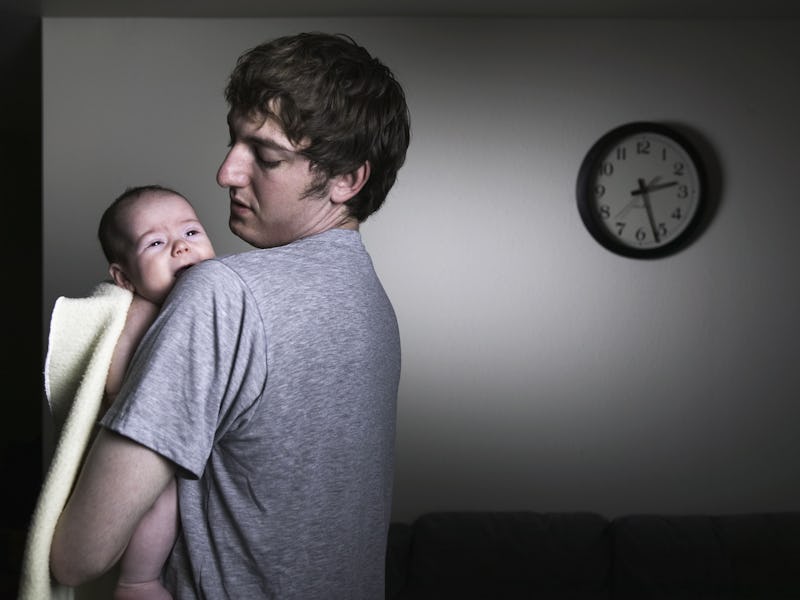Staying Up All Night Rewires Our Brains — This Could Be Key To Solving Mental Health Conditions
What happens in the brains of mice when they stay up all night could help us better understand mood and other psychological conditions.

Everyone remembers their first all-nighter. What’s probably more memorable, though, is the slap-happy, zombie-like mode the next day brings. That “sleep-drunk” feeling isn’t imaginary. Scientists have long thought that there is likely a neurological reason for this sensation, and one group of researchers thinks they might have cracked it.
A study published last week in the journal Neuron tracked what happened in the brains of mice when they stayed up all night. Their results, surprisingly, may even help us develop a better way to treat mood and other psychological conditions.
A counterintuitive antidepressant
A team at Northwestern University traced the neural pathway that produces those dizzy feelings after a sleepless night in mice. The researchers found that one all-nighter roughly had the same effects on the brain as taking the anesthetic ketamine.
One all-nighter roughly had the same effects on the brain as taking the anesthetic ketamine.
“The thing that surprised me the most is how potent the antidepressant effect was,” Yevgenia Kozorovitskiy, the study’s senior author and neurobiology professor at Northwestern University, tells Inverse. It’s so potent that it resembled her lab’s prior data on ketamine’s antidepressant effects. “It basically looks as good as a drug that is now very hyped about. We saw essentially the same effect magnitude.”
This isn’t an endorsement of acute sleep deprivation. “I definitely don't want the takeaway from the story to be, ‘Let's not sleep tonight,’” Kozorovitskiy says.
Insufficient sleep brings risk for myriad conditions and events, such as heart attacks, high blood pressure, diabetes, and stroke, way up. What’s more, sleep deprivation can push the antidepressant effect too far in the other direction, triggering manic episodes in people with mental health conditions like bipolar disorder. Going a night without shut-eye isn’t the latest craze that will cure your depression, but rather, this insight could shake up our approach to targeting different areas in the brain when developing antidepressant medications.
In other words: “Can we learn to mimic that without actually depriving the body of sleep,” Kozorovitskiy says.
Dopamine adaptation
The secret might lie in the neurotransmitter dopamine. Known commonly as the reward hormone, dopamine abounds when we eat and have sex. The idea is that we associate this good feeling from dopamine with the activity we’re doing, which increases our chances of survival. “It's very elegant to have a signal that essentially encodes things that feel good,” Kozorovitskiy says.
She and her team placed mice in an environment that kept them from falling asleep and then tracked their behaviors and scanned their brains. These all-nighter mice acted more aggressively than usual, evident by their hypersexual behavior toward others.
The team scanned four brain areas involved in dopamine release: the prefrontal cortex, nucleus accumbens, hypothalamus, and dorsal striatum. All but the dorsal striatum produced significant amounts of the neurotransmitter.
To further explore these regions’ effects, one at a time, the researchers switched off the mechanism that produced dopamine in each of those four brain regions. Surprisingly, when dopamine was shut off in the nucleus accumbens, the hypothalamus, and the dorsal striatum, the antidepressant effect from sleep deprivation continued. It only stopped when dopamine was switched off in the prefrontal cortex. This indicated that the prefrontal cortex is especially important for mood regulation in the brain, though researchers still don’t fully understand all the mechanisms involved.
Kozorovitskiy says there might be a reason we evolved to have this hyperactive behavior on little sleep. “There's something adaptive about being able to function at a very high level under conditions of sleep loss,” she says. Parents of newborns, for instance, can awaken at any hour of the night on little sleep and handle a delicate baby. Escaping from predators on no sleep also requires a burst of activity. “You also may need to acutely function living in the wild under conditions where you can't sleep due to predator danger.”
Mood remote control
While this finding helps us understand the brain, its most interesting attribute may be its contribution to developing antidepressant medications.
“The field of antidepressant therapy is going beyond traditional medications,” Mingzheng Wu, the study’s first author and a postdoctoral neuroscience researcher at Northwestern University, wrote in an email to Inverse. He mentions practices like chronotherapy, which modulates mood through sleep cycles and circadian rhythm. With behavioral changes and classic antidepressants, novel therapies could “alleviate depressive symptoms without triggering manic episodes,” Wu says.
But there are still more questions that need solving. Wu wants to know why neurons involved in dopamine production increase their activity during sleep deprivation. This analysis could yield answers to how to target particular pathways that result in maximum dopamine release in the prefrontal cortex.
“It's like finding the remote control for mood,” Wu says, “and it's right there in the human brain.”